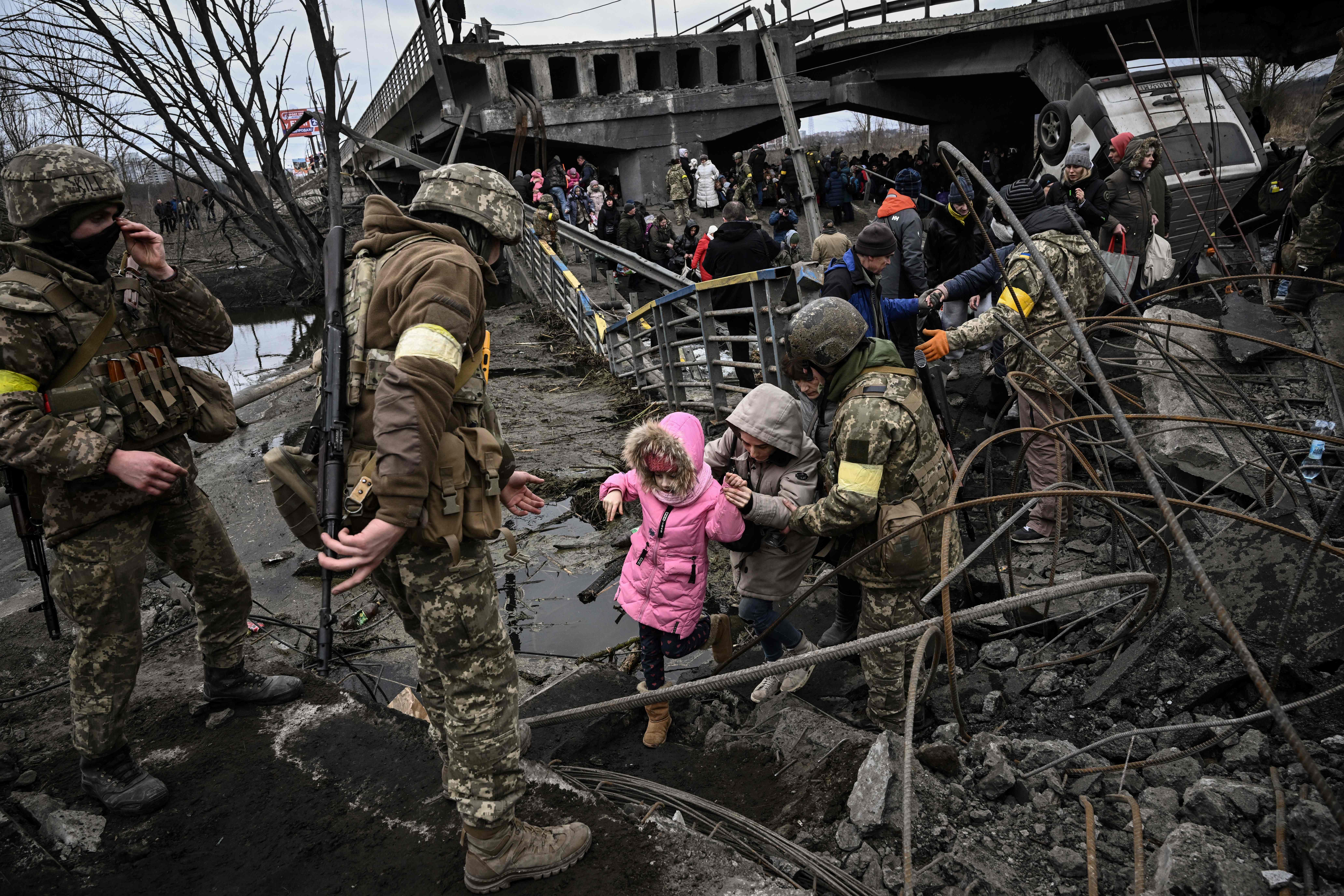I’ve had to ration how much of my news broadcasts on Ukraine my kids can watch
My teenagers will tune in to what’s going on, but not every night – and I fully acknowledge that switching off the horrors isn’t a privilege available to the families of Kharkiv, Kyiv and Kherson


Your support helps us to tell the story
From reproductive rights to climate change to Big Tech, The Independent is on the ground when the story is developing. Whether it's investigating the financials of Elon Musk's pro-Trump PAC or producing our latest documentary, 'The A Word', which shines a light on the American women fighting for reproductive rights, we know how important it is to parse out the facts from the messaging.
At such a critical moment in US history, we need reporters on the ground. Your donation allows us to keep sending journalists to speak to both sides of the story.
The Independent is trusted by Americans across the entire political spectrum. And unlike many other quality news outlets, we choose not to lock Americans out of our reporting and analysis with paywalls. We believe quality journalism should be available to everyone, paid for by those who can afford it.
Your support makes all the difference.Last week my husband and I found ourselves discussing types of nuclear bombs with the kids round the dinner table. It was our 13-year-old who brought the subject up, talking about the “Tsar Bomba”, and proceeding to detonate an array of “facts” about the truly terrifying power of this weapon. As debating nukes with our teenagers seemed to break all sorts of rules, I broke another one, bringing the phone to the table to google “Tsar Bomba”.
It turns out our 13-year-old had the gist of it right. Encyclopaedia Britannica reports this: “Tsar Bomba, (Russian: ‘King of Bombs’), byname of RDS-220, also called Big Ivan… the largest nuclear weapon ever set off, it produced the most powerful human-made explosion ever recorded. It had a 100-megaton capacity, though the resulting fallout from such a blast was considered too dangerous for a test situation. Thus, it was modified to yield 50 megatons, which was estimated to be about 3,800 times the strength of the US bomb dropped on Hiroshima during World War II.”
So now you know. And so do I.
My daughter had picked up the salient facts on TikTok (of course). And while we reassured each other that the Tsar Bomba was no more (and the Soviet scientist in charge of Russia’s thermonuclear weapons research, Andrei Sakharov, was so horrified by it that he became a strong backer of limiting such tests in future), the country still has the biggest nuclear arsenal in the world, with 5,977 warheads, according to the Federation of American Scientists.
By that point, I felt the conversation was careering out of control, and I started to play up the importance of deterrence: the Russians wouldn’t want to destroy us because they don’t want to destroy themselves. There are worrying doubts about whether Vladimir Putin is behaving quite so reasonably or rationally right now, especially after his apparent willingness to bomb hospitals and schools. But I was already concerned about oversharing, so we didn’t go there.
Afterwards, I worried. Should I have shut the conversation down, or muttered a few platitudes? Should one lie to one’s children about the threat of a nuclear confrontation? After all, we told all sorts of fibs about Father Christmas when they were younger.
After a bit more googling, I was relieved to see that child psychologists generally recommend careful honesty as the best policy. Be led by your child, many suggest. If they have questions, answer them frankly, but emphasise the positive outcomes. Telling them not to worry isn’t much cop. A war in Europe is deeply worrying, and there is no pretending otherwise.
Some also recommend rationing how much news your children absorb. And much as it pains me – as a Channel 4 News presenter – to admit it, we have started to do just that. They’ll tune in to what’s going on, but not every night – and I fully acknowledge that switching off the horrors isn’t a privilege available to the families of Kharkiv, Kyiv and Kherson.
To keep up to speed with all the latest opinions and comment, sign up to our free weekly Voices Dispatches newsletter by clicking here
Controlling the flow of information is one thing, but providing quality control is quite another. I’m not about to start Kremlin-style censorship of what our teens access, but keeping the conversation going seems to be crucial, so you can work out what they’re stumbling across – on TikTok, Instagram and elsewhere – and do a bit of a fact check.
Generation Z – the current crop of teenagers – have had a rough ride recently. First the pandemic saw schools closed, friends isolated, exams cancelled. Now Russia’s war is threatening to upend their lives again.
Covid was described as a “hinge event” – a crisis that changed how we all viewed the world. The Ukraine catastrophe is another, of perhaps even greater magnitude. Both crises have irrevocably changed the world our kids will inhabit. That’s an enormous burden for them to inherit.
It’s a burden that falls most heavily in Ukraine itself, of course, with child refugees carrying this war with them for their entire lives.
For the sake of Russia’s children, the Ukrainian kids who have already died in the first two weeks of this conflict, and our own, let’s hope today’s meeting between the Russian and Ukrainian foreign ministers might be the start of an outbreak of peace.
Yesterday’s appalling bombing of a hospital in Mariupol doesn’t give any of us much faith in that. Ukraine’s president says there are children buried in the rubble. Perhaps I’ll try not to discuss that round the dinner table tonight.
Cathy Newman presents ‘Channel 4 News’ at 7pm
Join our commenting forum
Join thought-provoking conversations, follow other Independent readers and see their replies
Comments